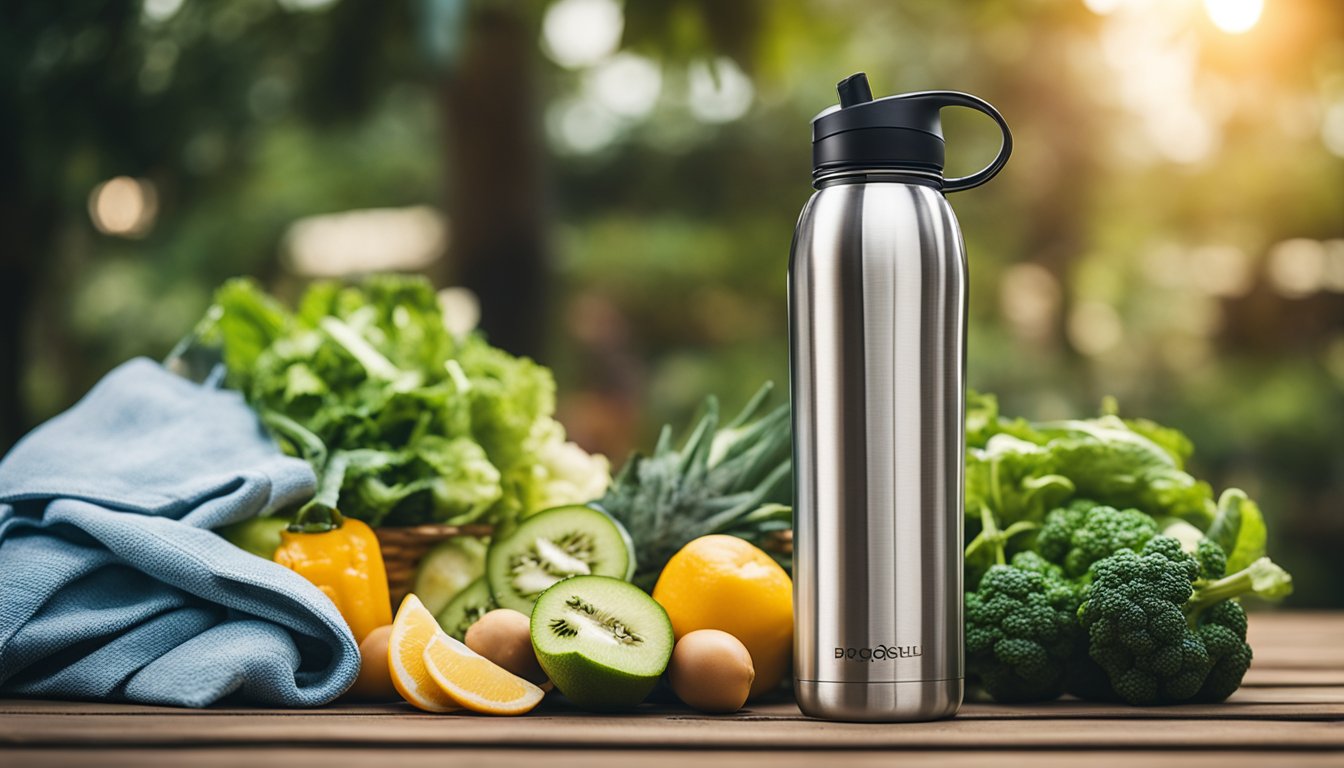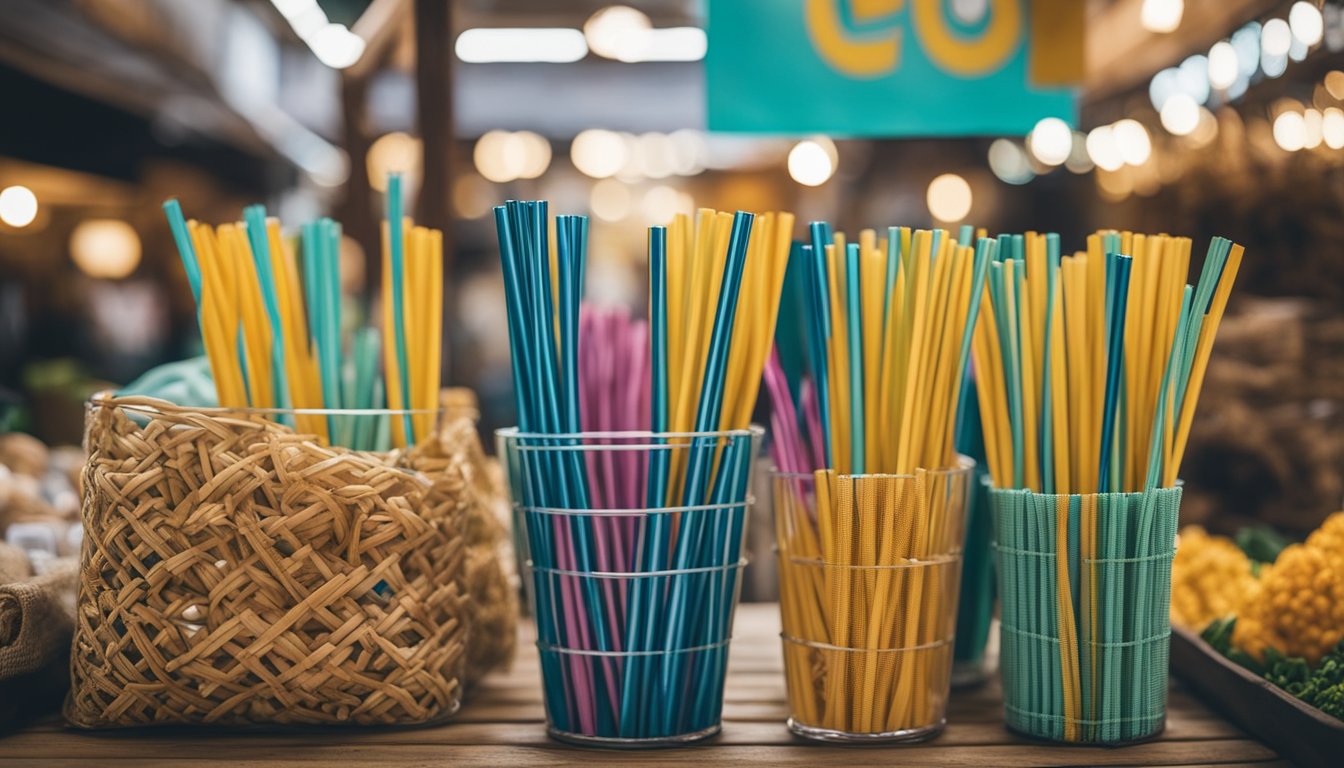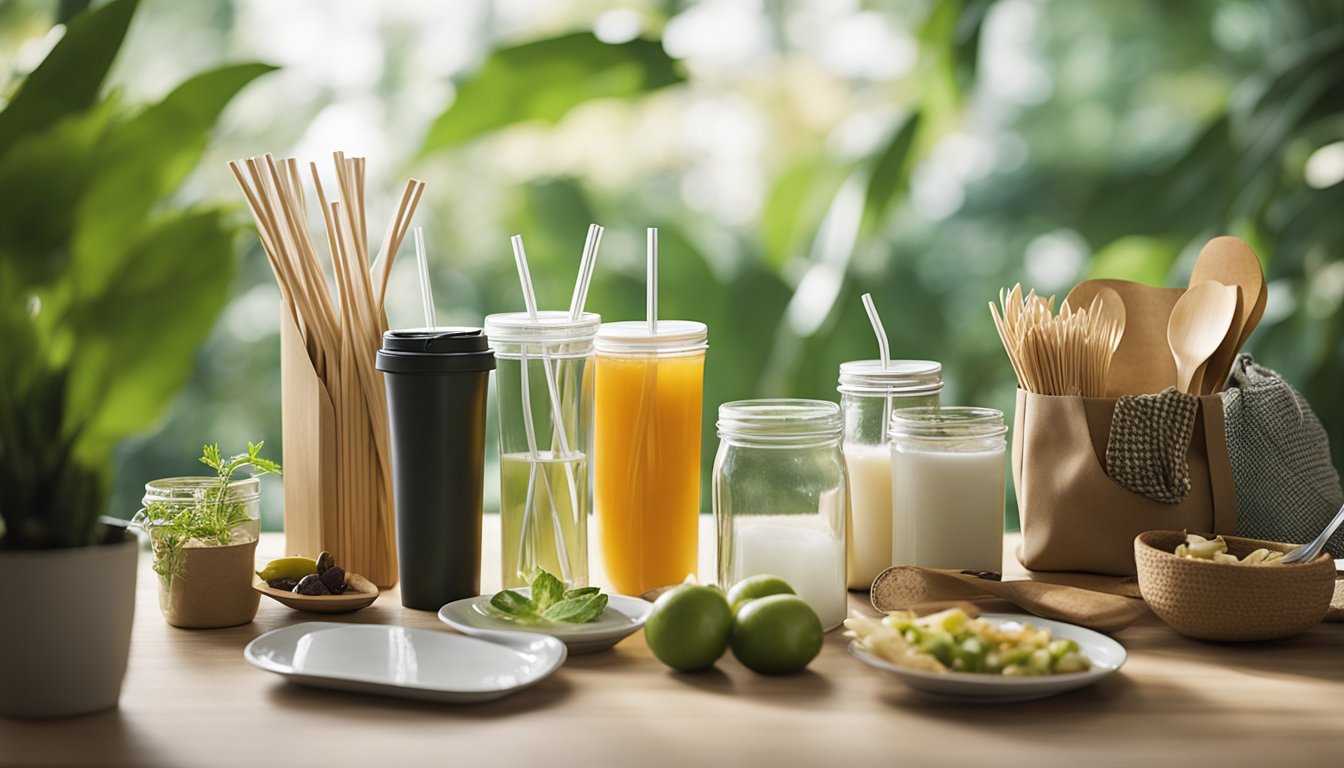Late updated: 27 Jun 2024 15:06
Written by: Sarah Hollister
Eco-Friendly Alternatives To Single-Use Plastics: Sustainable Solutions for Everyday Life
Reducing our reliance on single-use plastics is crucial for the health of our planet. Swapping out plastic items for eco-friendly alternatives can significantly reduce our environmental footprint. For example, using organic cotton bags instead of plastic shopping bags can help cut down on the billions of plastic bags discarded each year.

In the kitchen, we can replace plastic food containers with those made from glass or metal. Similarly, bamboo or wood cutlery and straws are excellent substitutes for their plastic counterparts. These materials not only serve the same function but also offer durability and biodegradability, making them a sustainable choice.
Beyond the kitchen, many companies now support bringing your reusable bottles and mugs instead of using disposable plastic cups. Brands like HydroFlask, Swell, and Starbucks offer various reusable options, encouraging us to ditch single-use items for good.
Key Takeaways
- Eco-friendly alternatives can significantly reduce our plastic waste.
- Glass, metal, and bamboo are durable alternatives to single-use plastics.
- Reusable bottles and bags are encouraged by many brands.
Impact of Single-Use Plastics
Our reliance on single-use plastics has wide-ranging consequences that affect the environment, human health, and the economy. It's crucial to explore the details of these impacts to understand why transitioning to eco-friendly alternatives is essential.
Environmental Consequences
Single-use plastics significantly contribute to environmental degradation. Their production and disposal generate massive greenhouse gas emissions, exacerbating climate change. For instance, producing 150 million tons of single-use plastics in 2018 released 750 million tons of carbon dioxide.
Plastics frequently end up in oceans and landfills, creating long-term pollution. Marine life and other wildlife often ingest or become entangled in plastic waste, leading to injury or death. Only a small fraction of plastic waste is recycled, making it a persistent pollutant.
Effects on Human Health
Single-use plastics pose numerous health risks. They often contain harmful chemicals, which can leach into food and beverages, leading to ingestion by humans. Chemicals like bisphenol A (BPA) and phthalates are linked to various health issues, including endocrine disruption and reproductive problems.
Microplastics, resulting from the breakdown of larger plastic items, infiltrate our water sources and food chain. These tiny particles can cause physical harm and potentially carry toxic substances into our bodies. Ingesting microplastics is an emerging concern with still uncertain long-term health effects.
Economic Implications
The economic cost of single-use plastic waste management is immense. Cleaning up plastic litter from public spaces and waterways requires significant public funding. Moreover, the environmental impact, such as damage to marine ecosystems, affects industries like fishing and tourism, leading to economic losses.
Plastic waste in landfills occupies valuable space, compelling communities to allocate resources for waste management and landfill expansion. Investing in recycling infrastructure and shifting towards sustainable materials can mitigate these economic burdens, ultimately benefiting society.
Exploring Sustainable Alternatives

To address the issues surrounding single-use plastics, we need to explore practical, eco-friendly alternatives. We'll cover reusable products, biodegradable and compostable options, and innovations in sustainable materials.
Reusable Products
Reusable products are vital in reducing our reliance on single-use plastics. Reusable water bottles, typically made from stainless steel or glass, offer a sustainable alternative to disposable plastic bottles. They are durable, easy to clean, and often insulated to keep beverages at the desired temperature.
Reusable bags are another excellent choice. Materials like cotton, jute, and even recycled plastic bottles are used to create reusable grocery bags. These bags are sturdy, washable, and can be used multiple times, significantly reducing plastic bag waste.
Reusable straws and cutlery made from stainless steel, bamboo, or glass also help minimise the use of disposable plastic straws and cutlery. These products come with their own convenient carrying cases, making them easy to transport and use on the go.
Biodegradable and Compostable Options
For items that cannot be replaced by reusable alternatives, biodegradable and compostable options provide a promising solution. Biodegradable plastics, such as polylactic acid (PLA), are made from renewable resources like corn starch. Although they require industrial composting facilities, they break down more quickly than traditional plastics.
Compostable cutlery and packaging made from materials like bamboo, paper, and palm leaves decompose naturally without leaving harmful residues. These products are excellent for events and places where washing reusable items is impractical.
Beeswax wraps replace single-use plastic wrap for food storage. Made from cotton infused with beeswax, these wraps are reusable, compostable, and can be refreshed with new beeswax when they start to wear out. They keep food fresh without the environmental cost of plastic wrap.
Innovations in Sustainable Materials
Innovations in sustainable materials are continually emerging to offer alternatives to single-use plastics. Bioplastics derived from algae, mycelium, and seaweed are cutting-edge solutions gaining traction. Mycelium packaging, made from mushroom roots, is sturdy and biodegradable, presenting an eco-friendly option for various packaging needs.
Glass containers and bottles offer another sustainable choice. Glass is endlessly recyclable, durable, and does not leach chemicals into food or drinks. Stasher bags, which are made from silicone, provide a reusable, recyclable, and safe alternative to plastic ziplock bags. They are versatile, being suitable for freezing, microwaving, and dishwashing.
Seaweed-based materials are being developed for a wide range of applications, from edible packaging to agricultural products. These materials are not only biodegradable but also provide the added benefit of sequestering carbon during growth, helping to combat climate change.
Frequently Asked Questions

In this section, we address common questions regarding eco-friendly alternatives to single-use plastics. We provide specific details on various sustainable materials and their environmental impacts.
What are the top five eco-friendly substitutes for single-use plastic items?
The top five eco-friendly substitutes include bamboo and wood cutlery, metal straws, silicone food storage bags, glass containers, and reusable metal bottles. Each of these materials is durable and helps reduce plastic waste.
Which biodegradable materials are recommended as alternatives to plastic?
Biodegradable materials such as bamboo, wood, and compostable bioplastics made from cornstarch or sugarcane are excellent alternatives. These materials break down more quickly in the environment compared to traditional plastics.
How does the environmental impact of plastic alternatives compare to traditional plastics?
Plastic alternatives often have a lower carbon footprint and generate less pollution. For example, bamboo and wood products decompose naturally, reducing landfill waste and ocean pollution. Additionally, metal and glass items can be recycled repeatedly without significant loss of quality.
What sustainable options exist for food packaging in place of single-use plastics?
Sustainable options for food packaging include silicone bags, beeswax wraps, and glass jars. These alternatives are not only reusable but also offer better preservation for food items. Compostable packaging made from plant fibres is another viable choice.
Which materials have been identified as the most sustainable replacements for plastic?
Materials identified as the most sustainable replacements include bamboo, metal (such as stainless steel), glass, and certain bioplastics. These materials are recyclable, biodegradable, and have a significantly lower environmental impact compared to traditional plastics.
Can eco-friendly products effectively replace plastics in everyday use?
Yes, eco-friendly products can effectively replace plastics in many everyday applications. Items such as reusable metal bottles, silicone food storage bags, and wooden cutlery provide practical and sustainable alternatives. Adoption of these products contributes to reducing plastic pollution and conserving natural resources.
